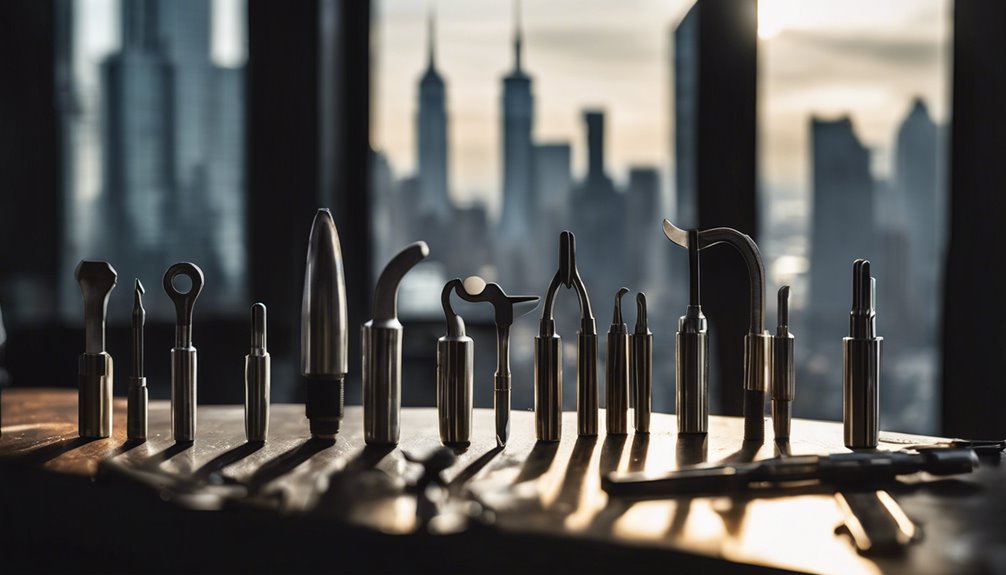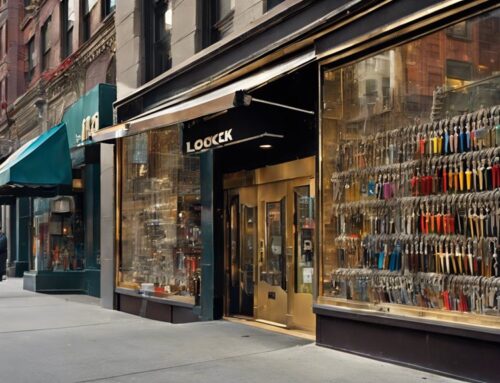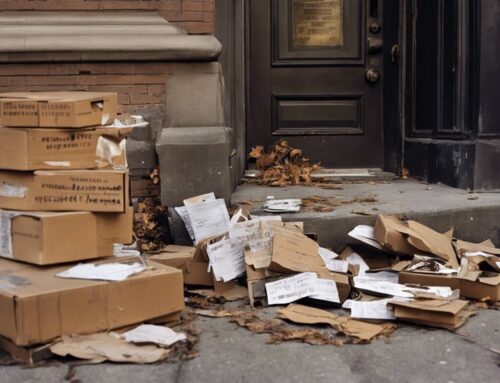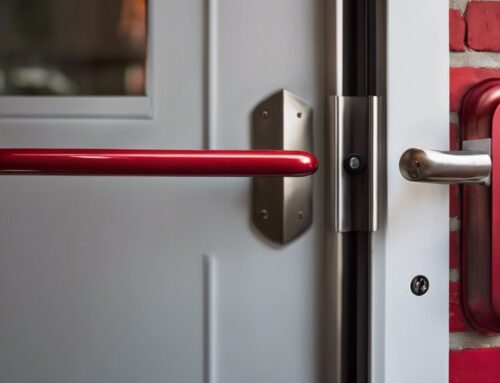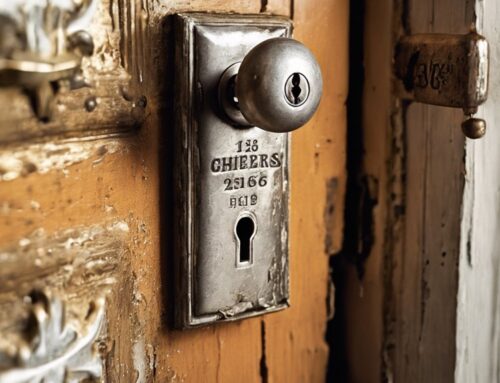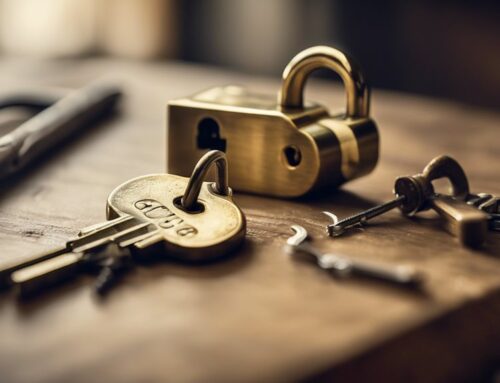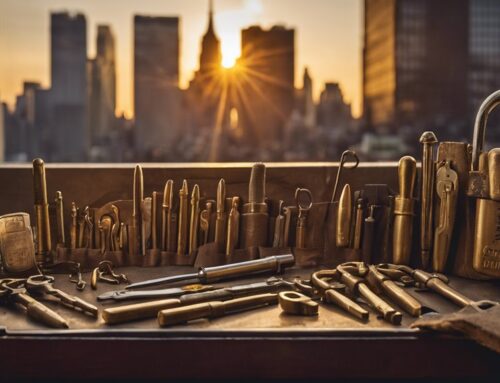When it comes to lock bumping and picking tools in New York, you need to navigate a complex web of legality that rests heavily on intent and consent. While it's perfectly legal for licensed locksmiths or those with permission from a property owner to possess these tools, using them without authorization can plunge you into serious legal trouble. Understanding these nuances is essential, but many people remain unaware of the full spectrum of consequences and regulations. So, what does that mean for your rights and responsibilities regarding these tools?
Key Takeaways
- Lock picking tools are legal in New York if possessed for legitimate purposes, such as locksmithing or personal security.
- Explicit permission from the property owner is required for lawful use of lock picking tools to avoid unauthorized entry charges.
- Intent is crucial; possessing lock picking tools with criminal intent is illegal and can lead to misdemeanor or felony charges.
- Licensed locksmiths and law enforcement can legally possess and use lock picking tools under New York law.
- Understanding local regulations and maintaining compliance is vital to avoid severe legal consequences related to lock picking tools.
Legal Ownership in New York
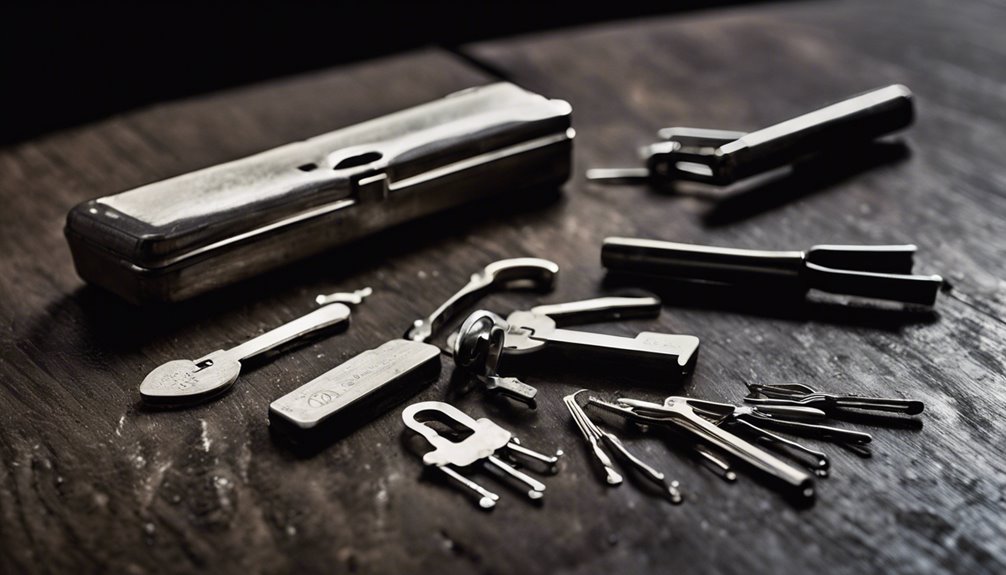
While owning lock picking tools is legal in New York, it's vital to understand the conditions surrounding their possession and use. These tools can be kept legally for legitimate purposes like locksmithing, education, or personal security needs. However, the significant factor lies in your intent. If you're found with these tools and you intend to commit a crime, then you're stepping into illegal territory. Licensed locksmiths and law enforcement personnel can rightfully possess these tools as part of their professional duties. You're also permitted to use them if you've obtained explicit permission from the property owner. Understanding state-specific regulations is crucial for compliance and legal ownership. Additionally, it's essential to note that possessing these tools for lawful professional use is a strong defense against potential legal issues. Furthermore, tenants also have specific rights regarding modifications to locks, which should be considered.
If you're a hobbyist or part of a lock picking club, establishing a valid reason for your possession is important to stay on the right side of the law. However, be cautious: using lock picking tools on locks without consent is illegal and could lead to serious repercussions. Carrying these tools in situations that suggest criminal intent can land you in hot water. The law views such actions very seriously, and the penalties can include fines and even jail time.
Understanding Intent and Permission
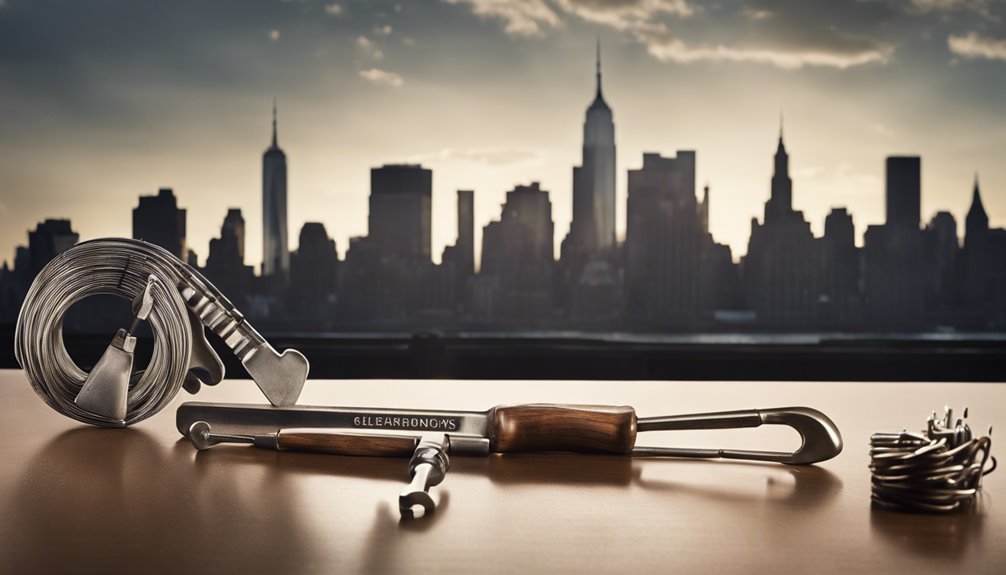
Understanding your intent and obtaining explicit permission are vital when it comes to the legality of lock picking in New York. Without clear authorization from the property owner, your possession of lock picking tools could result in serious legal repercussions. It's important to recognize that lawful ownership requires both a valid purpose and consent to avoid potential criminal charges. Additionally, learning lock picking can enhance your problem-solving skills, which may demonstrate responsible intent in possessing such tools. Furthermore, operating as a locksmith without a proper license poses significant legal risks that can affect your ability to work professionally in this field. To ensure compliance with state laws, understanding the legal landscape in New York related to locksmith practices is crucial for all professionals in the industry.
Legal Ownership Requirements
Legal ownership of lock picking tools in New York hinges on your intent and the permission granted for their use. To navigate this legal landscape, you'll need to understand the distinction between lawful and unlawful possession. It's important to note that employment laws can also have implications for how locksmiths use their tools. Moreover, locksmiths must understand their legal responsibilities in eviction procedures to ensure compliance with state laws.
| Purpose | Legal Status |
|---|---|
| Locksmithing | Legal |
| Law enforcement | Legal |
| Hobbyist activities without intent to commit a crime | Legal |
| Possession with intent to commit a crime | Illegal |
| Use without ownership or permission | Illegal |
Possessing these tools for lawful purposes, like locksmithing or education, is allowed. However, if you're carrying them with the intent to commit a crime, such as burglary, you could face severe penalties. Remember, intent is vital; lacking valid reasons for your possession can lead to legal repercussions. The legality of lock picking tools is often influenced by the public perception of their use, which varies among law enforcement. Consequently, make certain that your use of lock picking tools aligns with state regulations and ethical practices. Ultimately, understanding the legality of your tools requires keen awareness of your intentions and the circumstances surrounding their use. Always verify that your actions comply with New York's specific laws to protect your rights and freedom.
Importance of Explicit Permission
Before you decide to use lock picking tools, it's crucial to secure explicit permission from the property owner, as unauthorized use can lead to serious legal ramifications. Having a solid understanding of master key systems can also be beneficial in securing consent and managing property access.
Without this consent, using lock picking tools is deemed illegal entry, resulting in potential criminal charges that may include fines, imprisonment, or both.
The intent behind your actions greatly influences the legal landscape surrounding lock picking. If you possess these tools with plans to commit a crime, you're entering dangerous territory, risking misdemeanor or felony charges.
Conversely, if your intent is legitimate—such as in locksmithing or emergency access—the law generally supports your actions, provided you have obtained explicit permission. In cases related to an eviction, the property owner must follow legal protocols, such as ensuring changing locks after eviction complies with regulations.
To avoid legal quagmires, stay compliant with ethical practices and applicable laws. Always carry documentation when engaging in lock picking activities, and be ready to articulate your intentions if confronted by law enforcement.
Understanding and adhering to New York's regulations guarantees that your pursuits are in alignment with the law, promoting a responsible approach to freedom of engagement with lock mechanisms.
The thin line between unlawful and lawful use of lock picking tools makes permission not just wise, but legally vital.
Consequences of Violating Laws
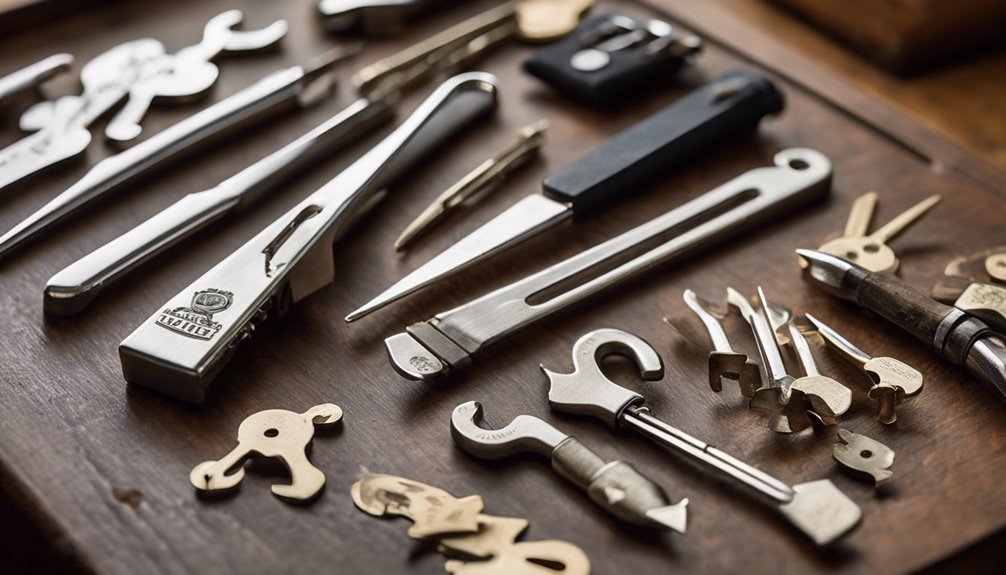
While many may underestimate the repercussions of violating lock picking laws in New York, the consequences can be severe. The penalties you face can range from misdemeanors to felonies, impacting your freedom and finances considerably. Knowing these potential outcomes can help you make informed decisions about your actions regarding lock picking tools. Additionally, professional locksmiths must ensure they adhere to essential ethical guidelines to avoid complications with the law.
| Offense Type | Potential Penalties |
|---|---|
| Misdemeanor | Up to 1 year in jail, fines |
| Felony | Longer prison sentences, severe fines |
| Repeat Offender | Escalating penalties, potential felonies |
| Criminal Record | Employment barriers, public records |
Possessing lock picking tools with unlawful intent is a criminal offense, and repeating such actions can escalate the severity of your charges. A misdemeanor conviction may lead to incarceration and a lasting criminal record, which can affect your employment opportunities and increase insurance rates. If you're required to pay restitution to victims, the financial implications can be immense, compounding legal fees and other costs.
Moreover, the state may impose additional civil penalties or mandates, such as probation or community service, complicating your life further. With a single misstep, you risk tainting your record and limiting your future possibilities. As a result, understanding the serious consequences of these laws isn't just about compliance; it's about safeguarding your freedom and future prospects and complying with the SAFE Act, which is essential for locksmiths operating within the bounds of New York state regulations.
Specific Legal Restrictions
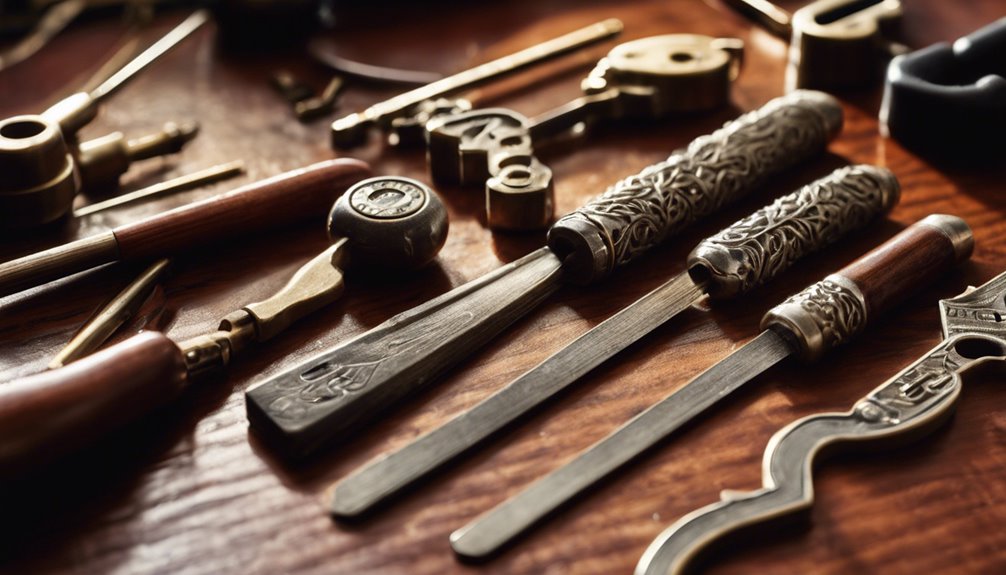
Although the possession of lock picking tools might seem innocuous, substantial legal restrictions govern their use in New York. Under Penal Law § 140.35, these tools are categorized as "burglar's tools." This classification includes any item adapted or designed for unlawful entry, which encompasses lock bumping keys as well. The law's broad definition means you must understand the implications of possessing such tools, as intent plays a significant role.
If you're a locksmith or law enforcement officer, you're legally permitted to own and use these tools, provided you comply with licensing requirements and professional standards. For non-professionals, explicit permission from a property owner is necessary to avoid legal repercussions. Even in hobbyist contexts, like competitive lockpicking, it's essential to confirm there's no intent to commit a crime.
Possession circumstances greatly influence legality. If you're found with these tools without a valid reason—like professional use or hobby—you may face serious consequences. Authorities may consider factors such as time, location, and any suspicious items nearby to assess your intent. For example, having lock picking tools in a car without justification could raise red flags.
While sellers of these tools aren't heavily regulated, this leniency doesn't extend to use and possession. Understanding these specific legal restrictions is crucial to navigate your rights effectively while respecting the law.
Keep your intentions clear and confirm that your actions always align with legal expectations to safeguard your freedom.
Comparison With Other States
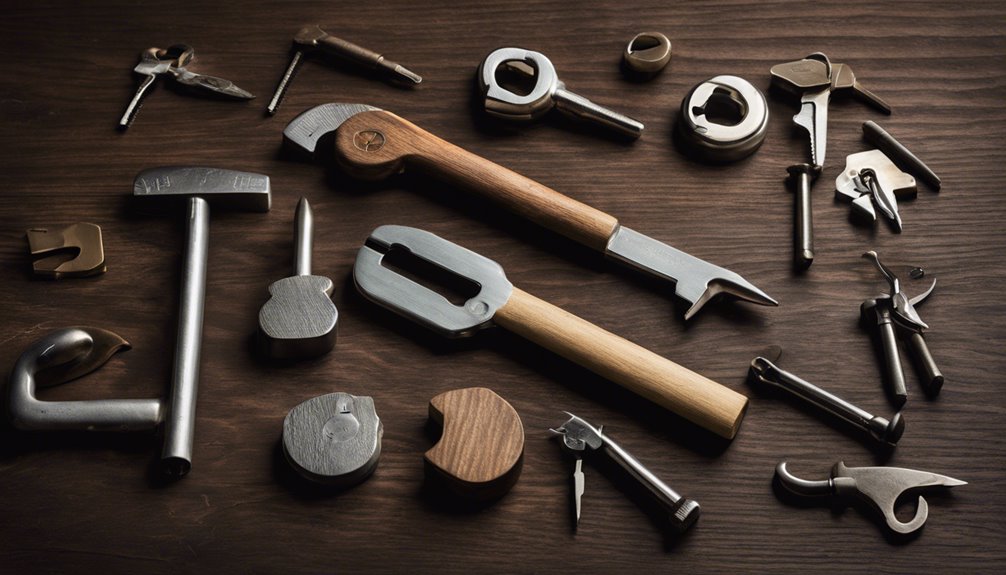
When you compare New York's regulations on lock picking with those of other states, you'll notice significant differences in intent and permission requirements.
For instance, while New York penalizes possession based on criminal intent, states like California and Florida enforce strict legal frameworks around ethical use.
Understanding these variances is essential for anyone dealing with lock picking tools, as state laws dictate not just legality but also the consequences of misuse.
State-Specific Regulations Overview
Understanding state-specific regulations regarding lock picking tools is essential, as these laws vary considerably across the United States, particularly when compared to New York. Below is an overview of how different states regulate the ownership, use, and penalties associated with lock picking tools.
| State | Ownership & Use | Penalties |
|---|---|---|
| New York | Legal if not intended for criminal use; can be used with consent. | Misdemeanor charges, fines, potential jail time. |
| Alabama | Possession with unlawful intent is criminal; requires authorization for use. | Fines and potential jail time for unlawful possession and use. |
| California | Allowed for legitimate purposes, not for crime; consent needed for use. | Fines and potential imprisonment for unlawful possession and use. |
| Illinois | Legal to possess; requires property owner consent for use. | Fines and potential imprisonment for violations. |
| Florida | Possession with intent for unlawful use is criminal; requires proper authorization. | Fines and potential imprisonment for unlawful possession and use. |
These regulations illustrate the need for awareness of state laws, as violating them can lead to severe legal consequences, underscoring the importance of ethical practices in lock picking.
Intent and Permission Variances
In New York, the legal standing of lock picking tools hinges substantially on intent and permission, mirroring regulations in several other states. Here, intent is critical—possessing these tools with the aim to commit a crime is illegal. If you can't justify your reason for ownership, you may face severe legal repercussions.
This principle aligns closely with California, where similar laws apply under Penal Code 466. Both states allow lawful use by licensed locksmiths or with explicit property owner permission.
Illinois shares this intent-based approach, permitting possession as long as there's no unlawful intention. Nonetheless, like New York, using these tools without proper authorization is considered criminal trespass.
The requirement for explicit permission is a common thread across all three states, emphasizing that hobbyists and professionals must secure consent before engaging in lock picking.
Ultimately, understanding these variances is essential to navigate the legal landscape surrounding lock picking tools. Whether you're a locksmith or an enthusiast, you should always prioritize intent and guarantee permission to operate within the law.
Violations could lead to misdemeanors or felonies, reflecting the serious nature of these regulations.
Responsible Use of Tools
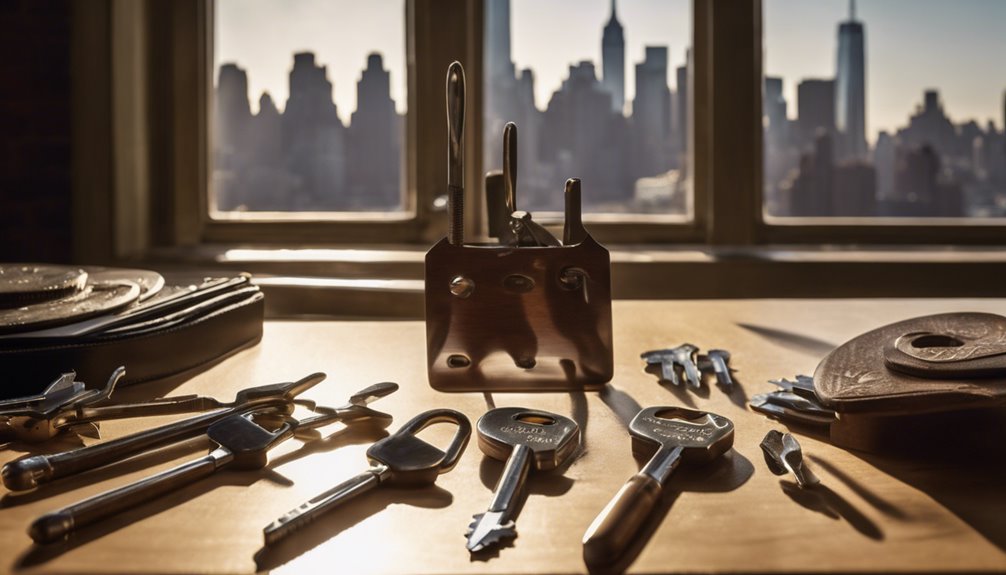
While legal ownership of lock picking tools allows for responsible use, it's important to abide by New York's regulations to avoid potential legal repercussions. As an owner of lock picking tools, your intentions matter greatly. Using these tools without explicit permission from the property owner can lead to serious legal issues.
Even if you own the lock, exercising caution and understanding the law is critical. Possessing these tools without a valid reason could classify them as burglary tools under New York law, which carries significant implications. Consequently, before using your tools, confirm that you have the necessary permission—especially when practicing on locks you don't own.
The consequences for misuse range from fines and jail time to civil penalties, making it imperative to operate within legal boundaries. Compliance goes beyond just having ownership; it involves continuous education on local and state laws.
Specific certifications may be required for locksmiths, and retaining transaction records could be mandatory when acquiring tools. Staying informed not only protects you legally but also supports the responsible use of your tools.
Best Practices for Lock Picking
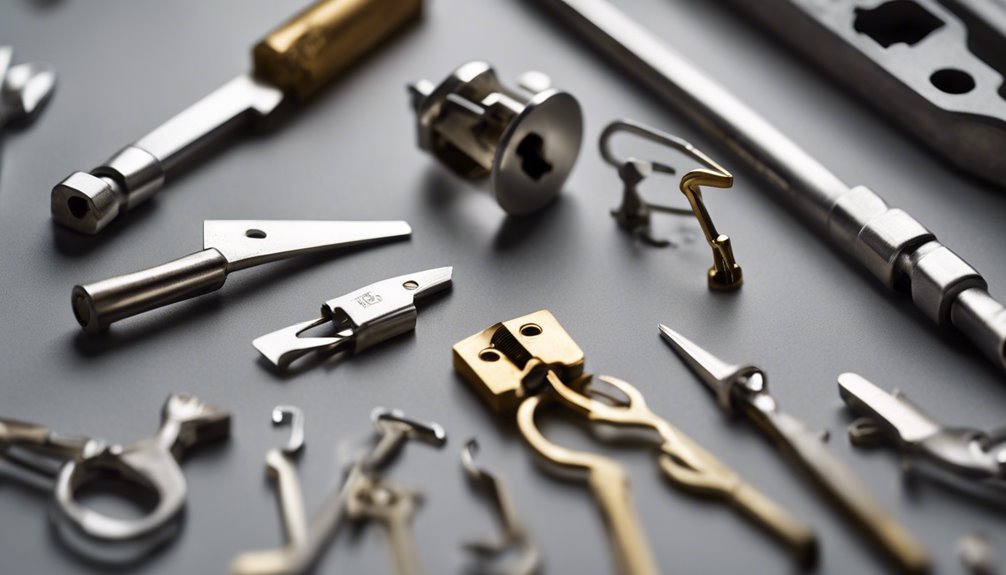
Possessing lock picking tools comes with a responsibility to use them wisely, which naturally leads to the importance of best practices in lock picking. First and foremost, always obtain explicit permission before attempting to pick a lock. This respect for property rights is non-negotiable. Only practice on locks you own or those for which you have explicit consent to avoid legal consequences.
When engaging in lock picking, quality matters. Use high-quality tools to prevent damage to both the lock and your equipment. Handle your tools responsibly, storing them in a protective case when not in use to prevent loss or damage. Additionally, working in a stable, well-lit area will enhance your precision and reduce the chance of mishaps.
In terms of technique, start by applying the proper amount of torque with a tension wrench to mimic key rotation. Employ single-pin picking (SPP) for meticulous manipulation, and don't hesitate to combine SPP with raking techniques for efficiency. Applying lubrication can reduce friction, keeping pins in place during your efforts.
Safety should always be a priority. Wear protective gear like gloves and safety glasses to prevent injuries, and clean your tools regularly to maintain their integrity. Remember to maintain a gentle touch throughout the process to avoid damaging the lock or your tools.
Staying Informed About Laws
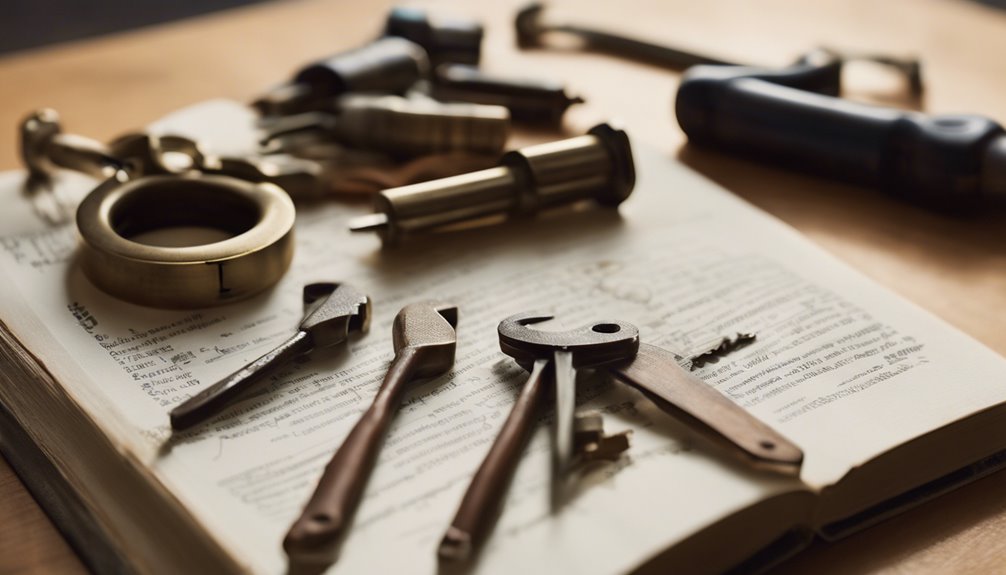
Staying informed about the laws governing lock picking is vital, especially for hobbyists and professionals alike. Knowledge of state-specific laws in New York prevents unintentional violations that could result in criminal charges.
You need to understand that possessing lock picking tools is legal only if you're a locksmith, law enforcement officer, or have explicit permission from the property owner. Intent plays a significant role; if law enforcement suspects you have these tools without a legal purpose, it could lead to serious legal repercussions.
Familiarize yourself with the definitions of burglary tools, as this could classify your lock picking tools in the wrong context. Remember, using these tools unlawfully is a criminal offense, potentially leading to misdemeanor or even felony charges. The consequences aren't just fines; they might include jail time and other legal ramifications.
Compliance isn't merely about understanding your rights; it's about being proactive. Keep abreast of local and federal regulations, especially if you're considering buying or selling lock picking tools. Confirm you retain documentation related to these transactions, as it may be required for legal inspection.
For enthusiasts, always practice on locks you own or for which you have explicit permission. Ultimately, staying informed protects your freedom to engage in this hobby by confirming you conduct yourself within legal bounds.
Maintain awareness of the ever-evolving legal landscape surrounding lock picking to safeguard your interests and responsibilities effectively.
Frequently Asked Questions
Can I Buy Lock Picking Tools Online in New York?
Yes, you can buy lock picking tools online in New York.
However, you'll need to be aware of the legal implications surrounding their use. You must possess them without intent to commit a crime and be ready to demonstrate your legitimate purpose.
Remember, using these tools on someone else's property without permission is illegal.
If you follow the laws, you can enjoy lock picking as a hobby or for legitimate purposes without facing penalties.
Are There Age Restrictions for Purchasing These Tools?
When it comes to purchasing lock picking tools, there aren't any specific age restrictions in New York. You can legally possess these tools, even as a minor.
However, it's essential to use them responsibly and ethically. Keep in mind that using these tools illegally can lead to serious consequences.
While you can buy them, always make sure you have permission if you're planning to use them on someone else's property to avoid any legal issues.
How Are Lock Picking Tools Typically Classified in the Law?
Lock picking tools are typically classified as burglary tools under certain legal frameworks.
If you possess these tools without a lawful purpose, authorities may view your intent as criminal.
Professionals like locksmiths are generally exempt, as their use aligns with legal practices.
Understanding your rights and obligations is essential; using these tools responsibly and with permission guarantees you remain compliant and avoids potential legal repercussions associated with misclassification.
Can Lock Picking Tools Be Inherited Legally?
Yes, you can legally inherit lock picking tools, but it hinges on your intent.
If you plan to use them for lawful purposes, like locksmithing or personal use, you won't face legal issues.
However, if you intend to use them unlawfully, that can lead to serious consequences.
Always remember, understanding and adhering to local laws regarding possession and use is essential to avoid penalties associated with unauthorized activities.
What Happens if I'm Caught With Lock Picking Tools?
Did you know that around 70% of individuals found with lock picking tools are charged based on intent?
If you're caught with such tools, law enforcement will evaluate the circumstances. If it's clear you're planning to commit a crime, you might face charges.
However, having a legitimate reason or permission from a property owner can shield you from legal repercussions.
Always guarantee your intent and context are above suspicion to avoid penalties.
Conclusion
Understanding the legality of lock bumping and picking tools in New York is like steering through a maze—each twist and turn represents the importance of intent, permission, and responsibility. You must wield these tools with care, like a skilled artist with a paintbrush, ensuring you stay within the lines of the law. By respecting the boundaries and staying informed, you can avoid the pitfalls that could lead to serious legal consequences, allowing you to operate confidently in this complex landscape.

